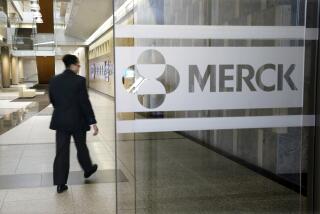Giants Dow, Monsanto May Sell Drug Units
- Share via
PHILADELPHIA — The recent flurry of restructurings in the drug industry has fueled speculation that two chemical giants--Monsanto Co. and Dow Chemical Co.--may seek to shed their drug units.
Analysts said Roche Holding Ltd.’s $5.3-billion acquisition last week of Syntex Corp. may have restored luster to drug firms’ values, which have been tarnished by fears that health care reform could put a cap on their earnings.
And Eastman Kodak Co.’s decision last Tuesday to sell its Sterling Winthrop Inc. drug subsidiary may make other parent companies think about divesting drug units.
“Chemical companies are on a big drive to strategic focus, and obviously removing the pharmaceutical operations from both Monsanto and Dow fits right into that big picture strategy,” said Paul Raman, analyst at S.G. Warburg.
Now may be the time to divest while drug stocks are up, analysts say. Although prices rose on the Syntex sale, drug stocks are still below the highs attained in recent years and may fall again if health care reform includes controls on drug prices.
David Saks, pharmaceutical analyst for Gruntal & Co., said that “the (drug) industry is in a very entrepreneurial environment, and mega-deals will continue to occur.”
Analysts say that under proposed reforms to the nation’s health care system, caps on drug prices could hamper business prospects.
Selling drug subsidiaries could lessen corporations’ exposure to the vagaries of pricing and politics, keeping safe their other businesses, they said.
The Syntex deal indicated that foreign companies may be willing to overlook U.S. health care reform and pay well for solid drug companies, Saks said.
“There is a revaluation of the industry dynamics that leads to a revaluation of the industry stocks,” he added.
Raman said that both Monsanto’s G.D. Searle & Co. drug subsidiary and Dow Chemical’s 72%-owned Marion Merrell Dow Inc. have similar characteristics to Syntex.
All three companies are second-tier firms with little global exposure and thin short-term but attractive long-term pipelines.
Based on Syntex’s value, Searle is worth about $25 per Monsanto share, about its previously estimated worth, Raman said. Marion Merrell Dow also is worth about $25 a share, he said.
Monsanto has made no secret that it its seeking to wring more value out of Searle, acquired in 1985.
Company Chairman Richard Mahoney said in Monsanto’s annual report that Searle was a sustainable operation, but fell short of Monsanto’s original intentions when it bought the firm.
Monsanto was seeking to form alliances with pharmaceutical companies that would raise Searle’s presence and reduce its costs, he said. “An intense effort is under way to find the right partners.”
More to Read
Inside the business of entertainment
The Wide Shot brings you news, analysis and insights on everything from streaming wars to production — and what it all means for the future.
You may occasionally receive promotional content from the Los Angeles Times.










